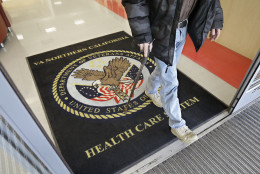Government Shutdown
-
In today's Federal Newscast, a new report from the Defense Department shows there was a slight increase in the amount of sexual assaults reported at military academies.
February 01, 2019 -
Ellen Dunagan, founder and president of Traverse Career Solutions, offers three suggestions for how furloughed federal employees can rethink their professional goals.
February 01, 2019 -
Two weeks out from the threat of another partial government shutdown, impacted federal employees are still trying to recover from the 35-day lapse they just endured.
January 31, 2019 -
Public Technology Institute's Executive Director Alan Shark provides interesting perspective on government shutdown, local government IT priorities for 2019, a comparison with NASCIO's state priorities, and discloses merger with CompTIA.
January 31, 2019 -
Our survey reveals a sense of resentment of the furloughed by those forced to work.
January 31, 2019 -
Cold as it may be in Washington, inside the Capitol the atmosphere is heated. Members are hard at work to get past the three-week continuing resolution now approaching its second week.
January 31, 2019 -
In today's Federal Newscast, the Veterans Affairs Department releases its much anticipated community care standards, which lay out what veterans are allowed to get medical treatment from non-VA doctors.
January 31, 2019 -
Nearly 90 percent of excepted employees who took a recent Federal News Network survey about their experiences during the 35-day government shutdown said morale is worse off than before the lapse began.
January 30, 2019 -
If there is another government shutdown on Feb. 15, it may be the earthquake that causes the retirement tsunami to finally strike.
January 30, 2019 -
The shutdown may or may not have soured people on the idea of federal service. But one agency is pushing ahead with a hiring fair Wednesday.
January 30, 2019 -
As more formerly furloughed feds filter back to work, no doubt they're finding all sorts of piled up tasks both pressing and trivial.
January 30, 2019 -
In today's Federal Newscast, Senate Democrats have brought forth a companion to a new bill from House Democratic leaders, which calls for giving civilian federal employees a 2.6 percent pay raise.
January 30, 2019 -
In the wake of the longest government shutdown in history, pushes to ensure one never happens again, primarily through an automatic continuing resolution, are picking up momentum. But just what is an automatic CR, and does one have a chance in Congress?
January 30, 2019 -
On a more cosmic level, the record-long 35 day shutdown raises lots of questions about the future of government service and civil servants. The issue is whether a lot of people quit or retire in disgust?
January 30, 2019 -
Federal contractors have never been made whole by Congress in the aftermath of a government shutdown, but a coalition of Democratic lawmakers have redoubled their efforts to see that change.
January 29, 2019















